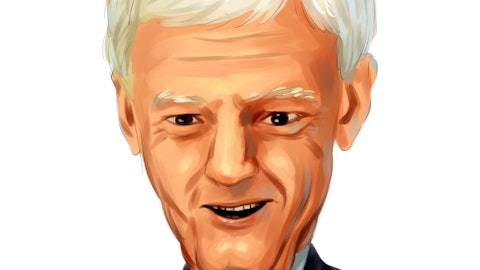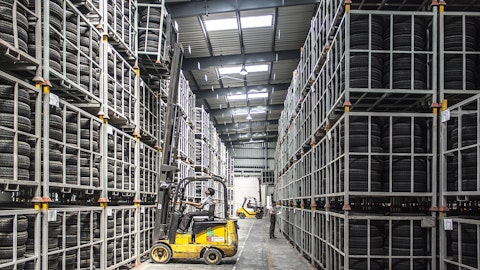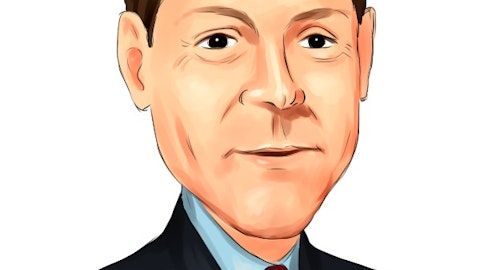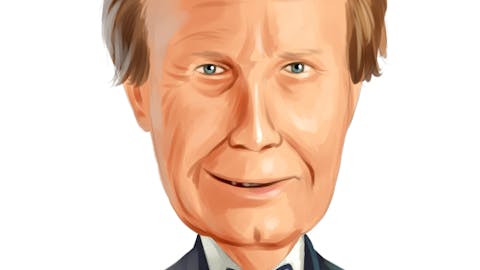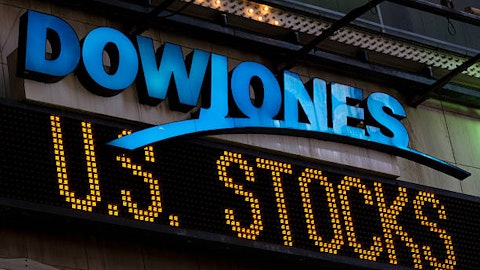Chip Moore: Thanks. That’s very helpful. And I guess to follow on that, Al. If we think about, a potential deeper recession, you talked again about this sort of shock absorber of the backlog position. And you also mentioned, I think, very low cancellation rates. Maybe just speak to historical replacement cycles and it feels like maybe this is a unique cycle in terms of what you could see in a recession scenario for the company?
Al Rankin: Well, it’s unique for us in the sense that we have never had a backlog anywhere near these levels. So, that’s the silver lining for some of the troubles that we’ve been working our way through here. We think that as Rajiv indicated in his remarks that the global markets will be turning down, we don’t see a deep or long recession because there’s an awful lot of pent-up demand as Rajiv suggested for forklift trucks and for enhanced productivity on the part of our customers. So I think we don’t see a deep global recession and a big drop off. We see just a downturn that brings us back to much more sustainable long-term levels. But in the meantime, whatever downturn there is, we’ve got a good chance of riding through it because of our backlog.
But understand also that as we produce and from our backlog, we’re adding to our backlog each month and at least at the current time, we’re continuing to book more good margin trucks than we anticipated in our plan. So that’s been continuing in January and February and we hope that trend may continue, but at the moment, while the backlog is reducing, its more moderate than what we were expecting, and it means that we’re extending further out into 2024 are most product lines. It’s not 100% of them, but on most product lines, they’re certainly the high value. And I think most markets are performing better than we expected that we expected more declines, and generally the markets are firmer than we thought they were going to be.
Chip Moore: That’s great. If I could sneak one more in on Nuvera, great to see those successful pilots underway. Can you comment maybe around getting activity more broadly? And then I think you mentioned that new much larger engines come into market. Maybe you can expand on that and what that would target?
Al Rankin: Yes, sure. I mean, the way Nuvera is going to market is to have some €“ or we have some focus segments that we think will really need to transition to fuel cells in their electrification journey. These are typically the heaviest duty type of larger trucks. And a good example of that is our port equipment. That’s why we’re focused on transitioning those first. But there are other industries that do that, you think about electrified buses. We’re also looking at, you’ve seen power generation both static, which is the new offering from Nuvera but they’re also working with partners who’ve got mobile generators, incredibly enough to charge lithium-ion battery cars and another vehicle. So just a mobile charger that has a fuel cell on board with lithium-ion batteries and acts as the charger for vehicles.
So, some new segments are appearing that they’re connected to. We think putting the demos out is the best way that they have found to really get customers engaged and to pursue their target market. So the best way to monitor how Nuvera is doing is to look at announcements that Nuvera will be making around demonstrations and partnerships as we move forward. In terms of the size of the engines, we are seeing demand for library engines more for truck applications and also starting to see some marine applications that they’re involved in along with locomotive. And each of those need larger platforms to support the power needs. So that’s why we are developing the 125 kilowatt engine and combination of those will be used in those applications.
